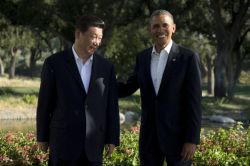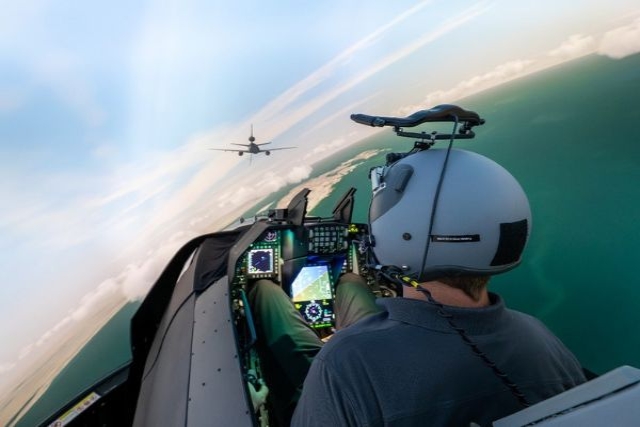Does The U.S. See China As the Next Superpower?

U.S President Barak Obama and his Chinese counterpart Xi Jinping on Monday met during an informal summit meeting in Washington to discuss the need to develop better military-to-military relations and improve cyber security cooperation. But behind this mild display of bonhomie, suspicions continue between the world’s only superpower and the aspiring superpower
China’s stellar economic growth has launched a massive military modernization program despite technology denial from the West. By reverse-engineering Russian military hardware, China has developed a plethora of weapons system and most recently inducted an aircraft carrier with plans to develop a second. Last year it revealed its version of a stealth fighter and is believed to have UAVs, radars, electronic counter-measures, artillery, helicopters and surface ships and submarines.
Its stunning growth would have the U.S, Europe and neighbors Japan and India convinced that China is close to becoming a military superpower in its own right.
However, Beijing’s more pressing concern is the new focus of U.S. foreign policy toward the Asia-Pacific region, the so-called "pivot” that is aimed at containing China's rise.
The “Pacific pivot” of U.S. forces to the region encompasses much more than the Pacific and will require close coordination and partnering with allies by the budget-stretched U.S. military, Navy and Marine Corp officials explained.
Most recently, the U.S. accused China of conducting cyber-espionage against it and ransacking designs to over two dozen U.S weapons systems including the he F/A-18 fighter jet, the V-22 Osprey, the Black Hawk helicopter and the Navy’s new Littoral Combat Ship, Aegis ballistic-missile defense system, Patriot missile system and the F-35 JSF.
Obama told reporters that he and Xi “had a very constructive conversation on a whole range of strategic issues, from North Korea to cyberspace to international institutions.”
“What both President Xi and I recognize,” Obama added, “is that because of these incredible advances in technology, that the issue of cybersecurity and the need for rules and common approaches to cybersecurity are going to be increasingly important as part of bilateral relationships and multilateral relationships.
“In some ways, these are uncharted waters and you don’t have the kinds of protocols that have governed military issues, for example, and arms issues, where nations have a lot of experience in trying to negotiate what’s acceptable and what’s not,” Obama continued. “And it’s critical, as two of the largest economies and military powers in the world that China and the United States arrive at a firm understanding of how we work together on these issues.”
Taking, what would appear as baby steps, their meeting laid a reasonable basis for cooperation and resulted in an agreement to discuss ways to curb the emission of hydrofluorocarbons, known as HFCs, an important step in addressing global warming.
But the U.S failed to convince China to ease its increasingly aggressive territorial claims in the South China and East China Seas, which are rousing precarious tensions with Japan and South Korea.
At the end of their two-day summit pledged to build “a new model” of relations and create a more comfortable relationship between the two nations to avoid plunging into an escalating conflict.
According to the White House, Presidents Obama and Xi found areas of agreement over North Korea. “They agreed that North Korea has to denuclearize, that neither country will accept North Korea as a nuclear-armed state” and that their two nations would work together to achieve that through pressure on Pyongyang, Tom Donilon, Obama’s departing national security adviser was quoted as saying.










